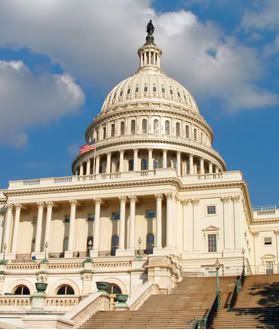
After multiple attempts, last night the Senate succeeded in passing the Baucus-Grassley Energy Improvement and Extension Act of 2008 on the ninth attempt for most of its renewable energy provisions. The difficulty of passing these provisions stems from the fact that too few Senate Republicans support clean energy or believe that climate change is a concern. A glance through these 50 times that McCain voted against clean energy other than nuclear power shows that for the most part the Republicans voted 50 times against clean energy too: for coal and oil, against solar and wind, waves and geothermal.
Although the Senate currently has a 51/49 Democratic "majority", it is still almost impossible to pass any legislation that the Republicans don't support because before the Senate can vote, first they must vote to vote: 60 must agree to have that vote-to-vote: the cloture vote. As a result, contrary to what most people believe, the Democrats don't need a mere 51 votes to pass legislation, they actually need 60 to hurdle the initial cloture-vote.
This 60 cloture-vote problem leads to a great deal of frustration. Voters become disgusted with the apparent ineffectiveness of "the congress" while not understanding the reason, and become apathetic and cynical. But it would be better if we just faced the reason for the difficulty, realizing that only by our succeeding in voting in a 60-40 majority Senate (either way), will the Senate be able to achieve whatever we sent them there for.
But this Baucus amendment was different. It had come within a hairs breadth of passage last December with a 59 cloture-vote. It had bipartisan support. You need 66 votes to prevent a White House veto, and typically, the Bush White House has also not supported Democratic energy bills. But this time around the Baucus/Grassley bill has not only easily hurdled its cloture of 60, but Baucus-Grassley has passed tonight with a decidedly veto-proof 93-2.
The extension for production tax credits for wind and solar had failed repeatedly: the Republicans fillibustered the cloture-vote eight times to prevent it.The funding mechanism had also failed previously because the Senate Republicans did not support reducing oil company subsidies.
Nevertheless, this bill funds renewable provisions by freezing a tax break for oil and gas companies at the current rate and tightening the rules on the taxes that oil and gas companies pay on income earned overseas, creating the $17 billion in funding needed. It was also partly offset with new limits on hedge-fund managers' ability to defer taxes on compensation they hold overseas.
Republicans gave up on preventing taxes on fossil fuels, but gained supports for tar-sands and oil shale development: refiners would be able to write off investments faster. Democrats also made concessions that weakened the clean energy aspects. But it passed. Until we have 60 Democrats in the Senate, we will not pass the meaningful renewable energy legislation our country needs to prevent climate change. But for now, this is what we got:
- An extension of the production tax credit (PTC) for wind for one year, and the PTC for solar, biomass, and wave and ocean tide projects for two years. Less than Democrats wanted (ten years was the original bill) but at least enough to save the much feared expiration at the end of this year. It includes an extension of the research and development tax credit totaling some $19 billion over 10 years that will help in inventing new energy sources such as such as algae development.
- Buyers of plug-in electric cars and plug-in hybrids will get a tax break of up to $7,500, depending on battery capacity of the vehicle: with a Volt or similar EV at the higher end. (Again, less than the original bill which encouraged the development of commercial delivery van PHEVs and EVs with a subsidy of up to $15,000.)
- Businesses would get a 30 percent tax credit for investing in solar, wind, geothermal and ocean energy equipment for eight more years. (And this includes home-based businesses)
- Homeowners could claim a tax credit of up to 10 percent of the cost of all qualified energy efficiency improvements, such as insulation, replacement windows, water heaters and heating and cooling equipment (which essentially reinstates identical LIHEAP legislation that Bush and the Republicans have repeatedly opposed) There are also incentives to use smart meters for more efficient home energy use.
- Under the Senate bill, solar tax credits will be extended for eight years, for both commercial and residential consumers. It includes a complete elimination of the $2000 cap for residential systems, allowing residential credits to rise to the 30% credit that commercial buildings get, and includes an allowance for utilities to make use of the commercial credit.
- Residential energy-efficient property credit would be extended through 2016, and the definition of the systems that qualify for that credit would be expanded to include wind investment and also home geothermal heat pumps, which would get 30% off, with a cap of
$6,667.
"If they try to mess with our package, it will come back here, it will die, and we... will have snatched defeat from the jaws of victory."
Indeed, the House with its abundance of Democrats should not assume anything else can pass the Senate with that 60 cloture-vote hurdle. As Senator Reid says--"Don't send us back something else. We can't get it passed."
Related stories:
McCain's 50 Votes Against Clean Energy
Obama's Clean Energy Voting Record
For Matternetwork


